- Home
- G. K. Chesterton
The Ball and the Cross Page 2
The Ball and the Cross Read online
Page 2
II. THE RELIGION OF THE STIPENDIARY MAGISTRATE
The editorial office of _The Atheist_ had for some years past becomeless and less prominently interesting as a feature of Ludgate Hill. Thepaper was unsuited to the atmosphere. It showed an interest in the Bibleunknown in the district, and a knowledge of that volume to which nobodyelse on Ludgate Hill could make any conspicuous claim. It was in vainthat the editor of _The Atheist_ filled his front window with fierceand final demands as to what Noah in the Ark did with the neck of thegiraffe. It was in vain that he asked violently, as for the last time,how the statement "God is Spirit" could be reconciled with the statement"The earth is His footstool." It was in vain that he cried with anaccusing energy that the Bishop of London was paid L12,000 a year forpretending to believe that the whale swallowed Jonah. It was in vainthat he hung in conspicuous places the most thrilling scientificcalculations about the width of the throat of a whale. Was it nothingto them all they that passed by? Did his sudden and splendid and trulysincere indignation never stir any of the people pouring down LudgateHill? Never. The little man who edited _The Atheist_ would rush from hisshop on starlit evenings and shake his fist at St. Paul's in the passionof his holy war upon the holy place. He might have spared his emotion.The cross at the top of St. Paul's and _The Atheist_ shop at the foot ofit were alike remote from the world. The shop and the Cross were equallyuplifted and alone in the empty heavens.
To the little man who edited _The Atheist_, a fiery little Scotchman,with fiery, red hair and beard, going by the name of Turnbull, all thisdecline in public importance seemed not so much sad or even mad, butmerely bewildering and unaccountable. He had said the worst thing thatcould be said; and it seemed accepted and ignored like the ordinarysecond best of the politicians. Every day his blasphemies looked moreglaring, and every day the dust lay thicker upon them. It made him feelas if he were moving in a world of idiots. He seemed among a race of menwho smiled when told of their own death, or looked vacantly at the Dayof Judgement. Year after year went by, and year after year the death ofGod in a shop in Ludgate became a less and less important occurrence.All the forward men of his age discouraged Turnbull. The socialistssaid he was cursing priests when he should be cursing capitalists.The artists said that the soul was most spiritual, not when freed fromreligion, but when freed from morality. Year after year went by, and atleast a man came by who treated Mr. Turnbull's secularist shop with areal respect and seriousness. He was a young man in a grey plaid, and hesmashed the window.
He was a young man, born in the Bay of Arisaig, opposite Rum and theIsle of Skye. His high, hawklike features and snaky black hair bore themark of that unknown historic thing which is crudely called Celtic, butwhich is probably far older than the Celts, whoever they were. He was inname and stock a Highlander of the Macdonalds; but his family took, aswas common in such cases, the name of a subordinate sept as a surname,and for all the purposes which could be answered in London, he calledhimself Evan MacIan. He had been brought up in some loneliness andseclusion as a strict Roman Catholic, in the midst of that little wedgeof Roman Catholics which is driven into the Western Highlands. And hehad found his way as far as Fleet Street, seeking some half-promisedemployment, without having properly realized that there were in theworld any people who were not Roman Catholics. He had uncovered himselffor a few moments before the statue of Queen Anne, in front of St.Paul's Cathedral, under the firm impression that it was a figure of theVirgin Mary. He was somewhat surprised at the lack of deference shown tothe figure by the people bustling by. He did not understand that theirone essential historical principle, the one law truly graven on theirhearts, was the great and comforting statement that Queen Anne is dead.This faith was as fundamental as his faith, that Our Lady was alive. Anypersons he had talked to since he had touched the fringe of our fashionor civilization had been by a coincidence, sympathetic or hypocritical.Or if they had spoken some established blasphemies, he had been unableto understand them merely owing to the preoccupied satisfaction of hismind.
On that fantastic fringe of the Gaelic land where he walked as a boy,the cliffs were as fantastic as the clouds. Heaven seemed to humbleitself and come closer to the earth. The common paths of his littlevillage began to climb quite suddenly and seemed resolved to go toheaven. The sky seemed to fall down towards the hills; the hills tookhold upon the sky. In the sumptuous sunset of gold and purple andpeacock green cloudlets and islets were the same. Evan lived like a manwalking on a borderland, the borderland between this world and another.Like so many men and nations who grow up with nature and the commonthings, he understood the supernatural before he understood the natural.He had looked at dim angels standing knee-deep in the grass before hehad looked at the grass. He knew that Our Lady's robes were blue beforehe knew the wild roses round her feet were red. The deeper his memoryplunged into the dark house of childhood the nearer and nearer he cameto the things that cannot be named. All through his life he thought ofthe daylight world as a sort of divine debris, the broken remainderof his first vision. The skies and mountains were the splendidoff-scourings of another place. The stars were lost jewels of the Queen.Our Lady had gone and left the stars by accident.
His private tradition was equally wild and unworldly. Hisgreat-grandfather had been cut down at Culloden, certain in his lastinstant that God would restore the King. His grandfather, then a boy often, had taken the terrible claymore from the hand of the dead and hungit up in his house, burnishing it and sharpening it for sixty years, tobe ready for the next rebellion. His father, the youngest son and thelast left alive, had refused to attend on Queen Victoria in Scotland.And Evan himself had been of one piece with his progenitors; and was notdead with them, but alive in the twentieth century. He was not in theleast the pathetic Jacobite of whom we read, left behind by a finaladvance of all things. He was, in his own fancy, a conspirator, fierceand up to date. In the long, dark afternoons of the Highland winter, heplotted and fumed in the dark. He drew plans of the capture of London onthe desolate sand of Arisaig.
When he came up to capture London, it was not with an army of whitecockades, but with a stick and a satchel. London overawed him a little,not because he thought it grand or even terrible, but because itbewildered him; it was not the Golden City or even hell; it was Limbo.He had one shock of sentiment, when he turned that wonderful corner ofFleet Street and saw St. Paul's sitting in the sky.
"Ah," he said, after a long pause, "that sort of thing was built underthe Stuarts!" Then with a sour grin he asked himself what wasthe corresponding monument of the Brunswicks and the ProtestantConstitution. After some warning, he selected a sky-sign of some pill.
Half an hour afterwards his emotions left him with an emptied mind onthe same spot. And it was in a mood of mere idle investigation that hehappened to come to a standstill opposite the office of _The Atheist_.He did not see the word "atheist", or if he did, it is quite possiblethat he did not know the meaning of the word. Even as it was, thedocument would not have shocked even the innocent Highlander, but forthe troublesome and quite unforeseen fact that the innocent Highlanderread it stolidly to the end; a thing unknown among the most enthusiasticsubscribers to the paper, and calculated in any case to create a newsituation.
With a smart journalistic instinct characteristic of all his school, theeditor of _The Atheist_ had put first in his paper and most prominentlyin his window an article called "The Mesopotamian Mythology and itsEffects on Syriac Folk Lore." Mr. Evan MacIan began to read this quiteidly, as he would have read a public statement beginning with a younggirl dying in Brighton and ending with Bile Beans. He received the veryconsiderable amount of information accumulated by the author withthat tired clearness of the mind which children have on heavy summerafternoons--that tired clearness which leads them to go on askingquestions long after they have lost interest in the subject and areas bored as their nurse. The streets were full of people and empty ofadventures. He might as well know about the gods of Mesopotamia as not;so he flattened his long, lean face against th
e dim bleak pane of thewindow and read all there was to read about Mesopotamian gods. He readhow the Mesopotamians had a god named Sho (sometimes pronounced Ji), andthat he was described as being very powerful, a striking similarity tosome expressions about Jahveh, who is also described as having power.Evan had never heard of Jahveh in his life, and imagining him to be someother Mesopotamian idol, read on with a dull curiosity. He learnt thatthe name Sho, under its third form of Psa, occurs in an early legendwhich describes how the deity, after the manner of Jupiter on so manyoccasions, seduced a Virgin and begat a hero. This hero, whose name isnot essential to our existence, was, it was said, the chief hero andSaviour of the Mesopotamian ethical scheme. Then followed a paragraphgiving other examples of such heroes and Saviours being born ofsome profligate intercourse between God and mortal. Then followed aparagraph--but Evan did not understand it. He read it again and thenagain. Then he did understand it. The glass fell in ringing fragmentson to the pavement, and Evan sprang over the barrier into the shop,brandishing his stick.
"What is this?" cried little Mr. Turnbull, starting up with hair aflame."How dare you break my window?"
"Because it was the quickest cut to you," cried Evan, stamping. "Standup and fight, you crapulous coward. You dirty lunatic, stand up, willyou? Have you any weapons here?"
"Are you mad?" asked Turnbull, glaring.
"Are you?" cried Evan. "Can you be anything else when you plaster yourown house with that God-defying filth? Stand up and fight, I say."
A great light like dawn came into Mr. Turnbull's face. Behind his redhair and beard he turned deadly pale with pleasure. Here, after twentylone years of useless toil, he had his reward. Someone was angry withthe paper. He bounded to his feet like a boy; he saw a new youth openingbefore him. And as not unfrequently happens to middle-aged gentlemenwhen they see a new youth opening before them, he found himself in thepresence of the police.
The policemen, after some ponderous questionings, collared both the twoenthusiasts. They were more respectful, however, to the young man whohad smashed the window, than to the miscreant who had had his windowsmashed. There was an air of refined mystery about Evan MacIan, whichdid not exist in the irate little shopkeeper, an air of refined mysterywhich appealed to the policemen, for policemen, like most otherEnglish types, are at once snobs and poets. MacIan might possibly be agentleman, they felt; the editor manifestly was not. And the editor'sfine rational republican appeals to his respect for law, and his ardourto be tried by his fellow citizens, seemed to the police quite as muchgibberish as Evan's mysticism could have done. The police were not usedto hearing principles, even the principles of their own existence.
The police magistrate, before whom they were hurried and tried, wasa Mr. Cumberland Vane, a cheerful, middle-aged gentleman, honourablycelebrated for the lightness of his sentences and the lightness of hisconversation. He occasionally worked himself up into a sort of theoreticrage about certain particular offenders, such as the men who tookpokers to their wives, talked in a loose, sentimental way about thedesirability of flogging them, and was hopelessly bewildered by the factthat the wives seemed even more angry with him than with theirhusbands. He was a tall, spruce man, with a twist of black moustacheand incomparable morning dress. He looked like a gentleman, and yet,somehow, like a stage gentleman.
He had often treated serious crimes against mere order or propertywith a humane flippancy. Hence, about the mere breaking of an editor'swindow, he was almost uproarious.
"Come, Mr. MacIan, come," he said, leaning back in his chair, "do yougenerally enter you friends' houses by walking through the glass?"(Laughter.)
"He is not my friend," said Evan, with the stolidity of a dull child.
"Not your friend, eh?" said the magistrate, sparkling. "Is he yourbrother-in-law?" (Loud and prolonged laughter.)
"He is my enemy," said Evan, simply; "he is the enemy of God."
Mr. Vane shifted sharply in his seat, dropping the eye-glass out of hiseye in a momentary and not unmanly embarrassment.
"You mustn't talk like that here," he said, roughly, and in a kind ofhurry, "that has nothing to do with us."
Evan opened his great, blue eyes; "God," he began.
"Be quiet," said the magistrate, angrily, "it is most undesirable thatthings of that sort should be spoken about--a--in public, and in anordinary Court of Justice. Religion is--a--too personal a matter to bementioned in such a place."
"Is it?" answered the Highlander, "then what did those policemen swearby just now?"
"That is no parallel," answered Vane, rather irritably; "of course thereis a form of oath--to be taken reverently--reverently, and there's anend of it. But to talk in a public place about one's most sacred andprivate sentiments--well, I call it bad taste. (Slight applause.) Icall it irreverent. I call it irreverent, and I'm not specially orthodoxeither."
"I see you are not," said Evan, "but I am."
"We are wondering from the point," said the police magistrate, pullinghimself together.
"May I ask why you smashed this worthy citizen's window?"
Evan turned a little pale at the mere memory, but he answered with thesame cold and deadly literalism that he showed throughout.
"Because he blasphemed Our Lady."
"I tell you once and for all," cried Mr. Cumberland Vane, rapping hisknuckles angrily on the table, "I tell you, once and for all, my man,that I will not have you turning on any religious rant or cant here.Don't imagine that it will impress me. The most religious people arenot those who talk about it. (Applause.) You answer the questions and donothing else."
"I did nothing else," said Evan, with a slight smile.
"Eh," cried Vane, glaring through his eye-glass.
"You asked me why I broke his window," said MacIan, with a face of wood."I answered, 'Because he blasphemed Our Lady.' I had no other reason. SoI have no other answer." Vane continued to gaze at him with a sternnessnot habitual to him.
"You are not going the right way to work, Sir," he said, with severity."You are not going the right way to work to--a--have your case treatedwith special consideration. If you had simply expressed regret for whatyou had done, I should have been strongly inclined to dismiss the matteras an outbreak of temper. Even now, if you say that you are sorry Ishall only----"
"But I am not in the least sorry," said Evan, "I am very pleased."
"I really believe you are insane," said the stipendiary, indignantly,for he had really been doing his best as a good-natured man, to composethe dispute. "What conceivable right have you to break other people'swindows because their opinions do not agree with yours? This man onlygave expression to his sincere belief."
"So did I," said the Highlander.
"And who are you?" exploded Vane. "Are your views necessarily the rightones? Are you necessarily in possession of the truth?"
"Yes," said MacIan.
The magistrate broke into a contemptuous laugh.
"Oh, you want a nurse to look after you," he said. "You must pay L10."
Evan MacIan plunged his hands into his loose grey garment and drew out aqueer looking leather purse. It contained exactly twelve sovereigns.He paid down the ten, coin by coin, in silence, and equally silentlyreturned the remaining two to the receptacle. Then he said, "May I say aword, your worship?"
Cumberland Vane seemed half hypnotized with the silence and automaticmovements of the stranger; he made a movement with his head which mighthave been either "yes" or "no". "I only wished to say, your worship,"said MacIan, putting back the purse in his trouser pocket, "thatsmashing that shop window was, I confess, a useless and rather irregularbusiness. It may be excused, however, as a mere preliminary to furtherproceedings, a sort of preface. Wherever and whenever I meet that man,"and he pointed to the editor of _The Atheist_, "whether it be outsidethis door in ten minutes from now, or twenty years hence in some distantcountry, wherever and whenever I meet that man, I will fight him. Do notbe afraid. I will not rush at him like a bully, or bear him down withany brute superiorit
y. I will fight him like a gentleman; I will fighthim as our fathers fought. He shall choose how, sword or pistol, horseor foot. But if he refuses, I will write his cowardice on every wallin the world. If he had said of my mother what he said of the Mother ofGod, there is not a club of clean men in Europe that would deny myright to call him out. If he had said it of my wife, you English wouldyourselves have pardoned me for beating him like a dog in the marketplace. Your worship, I have no mother; I have no wife. I have only thatwhich the poor have equally with the rich; which the lonely have equallywith the man of many friends. To me this whole strange world is homely,because in the heart of it there is a home; to me this cruel world iskindly, because higher than the heavens there is something more humanthan humanity. If a man must not fight for this, may he fight foranything? I would fight for my friend, but if I lost my friend, I shouldstill be there. I would fight for my country, but if I lost my country,I should still exist. But if what that devil dreams were true, I shouldnot be--I should burst like a bubble and be gone. I could not live inthat imbecile universe. Shall I not fight for my own existence?"
The magistrate recovered his voice and his presence of mind. The firstpart of the speech, the bombastic and brutally practical challenge,stunned him with surprise; but the rest of Evan's remarks, branching offas they did into theoretic phrases, gave his vague and very Englishmind (full of memories of the hedging and compromise in English publicspeaking) an indistinct sensation of relief, as if the man, though mad,were not so dangerous as he had thought. He went into a sort of wearylaughter.
"For Heaven's sake, man," he said, "don't talk so much. Let other peoplehave a chance (laughter). I trust all that you said about asking Mr.Turnbull to fight, may be regarded as rubbish. In case of accidents,however, I must bind you over to keep the peace."
"To keep the peace," repeated Evan, "with whom?"
"With Mr. Turnbull," said Vane.
"Certainly not," answered MacIan. "What has he to do with peace?"
"Do you mean to say," began the magistrate, "that you refuse to..." Thevoice of Turnbull himself clove in for the first time.
"Might I suggest," he said, "That I, your worship, can settle to someextent this absurd matter myself. This rather wild gentleman promisesthat he will not attack me with any ordinary assault--and if he does,you may be sure the police shall hear of it. But he says he will not. Hesays he will challenge me to a duel; and I cannot say anything strongerabout his mental state than to say that I think that it is highlyprobable that he will. (Laughter.) But it takes two to make a duel, yourworship (renewed laughter). I do not in the least mind being describedon every wall in the world as the coward who would not fight a manin Fleet Street, about whether the Virgin Mary had a parallel inMesopotamian mythology. No, your worship. You need not trouble to bindhim over to keep the peace. I bind myself over to keep the peace, andyou may rest quite satisfied that there will be no duel with me in it."
Mr. Cumberland Vane rolled about, laughing in a sort of relief.
"You're like a breath of April, sir," he cried. "You're ozone afterthat fellow. You're perfectly right. Perhaps I have taken the thing tooseriously. I should love to see him sending you challenges and to seeyou smiling. Well, well."
Evan went out of the Court of Justice free, but strangely shaken, likea sick man. Any punishment of suppression he would have felt as natural;but the sudden juncture between the laughter of his judge and thelaughter of the man he had wronged, made him feel suddenly small, or atleast, defeated. It was really true that the whole modern world regardedhis world as a bubble. No cruelty could have shown it, but theirkindness showed it with a ghastly clearness. As he was brooding, hesuddenly became conscious of a small, stern figure, fronting himin silence. Its eyes were grey and awful, and its beard red. It wasTurnbull.
"Well, sir," said the editor of _The Atheist_, "where is the fight tobe? Name the field, sir."
Evan stood thunderstruck. He stammered out something, he knew not what;he only guessed it by the answer of the other.
"Do I want to fight? Do I want to fight?" cried the furiousFree-thinker. "Why, you moonstruck scarecrow of superstition, do youthink your dirty saints are the only people who can die? Haven't youhung atheists, and burned them, and boiled them, and did they ever denytheir faith? Do you think we don't want to fight? Night and day I haveprayed--I have longed--for an atheist revolution--I have longed to seeyour blood and ours on the streets. Let it be yours or mine?"
"But you said..." began MacIan.
"I know," said Turnbull scornfully. "And what did you say? You damnedfool, you said things that might have got us locked up for a year, andshadowed by the coppers for half a decade. If you wanted to fight, whydid you tell that ass you wanted to? I got you out, to fight if you wantto. Now, fight if you dare."
"I swear to you, then," said MacIan, after a pause. "I swear to you thatnothing shall come between us. I swear to you that nothing shall be inmy heart or in my head till our swords clash together. I swear it by theGod you have denied, by the Blessed Lady you have blasphemed; I swear itby the seven swords in her heart. I swear it by the Holy Island where myfathers are, by the honour of my mother, by the secret of my people, andby the chalice of the Blood of God."
The atheist drew up his head. "And I," he said, "give my word."

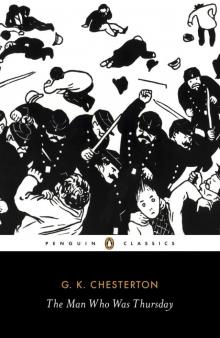 The Man Who Was Thursday: A Nightmare
The Man Who Was Thursday: A Nightmare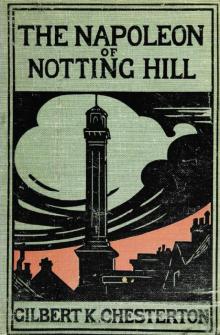 The Napoleon of Notting Hill
The Napoleon of Notting Hill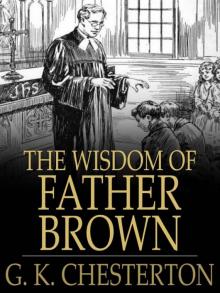 The Wisdom of Father Brown
The Wisdom of Father Brown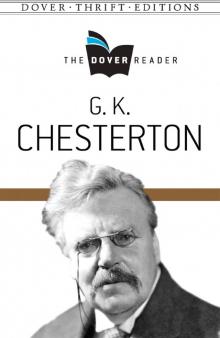 G K Chesterton- The Dover Reader
G K Chesterton- The Dover Reader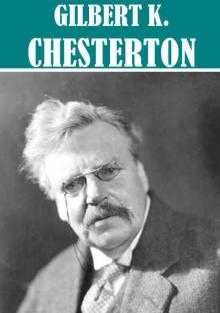 The Essential G. K. Chesterton
The Essential G. K. Chesterton The Trees of Pride
The Trees of Pride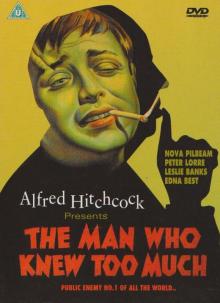 The Man Who Knew Too Much
The Man Who Knew Too Much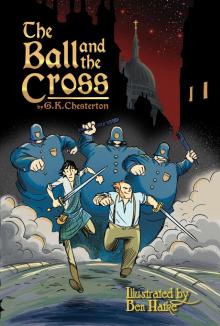 The Ball and the Cross
The Ball and the Cross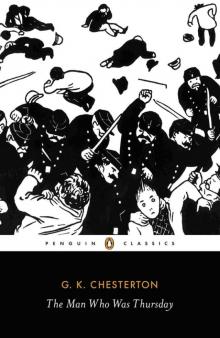 The Man Who Was Thursday (Penguin ed)
The Man Who Was Thursday (Penguin ed)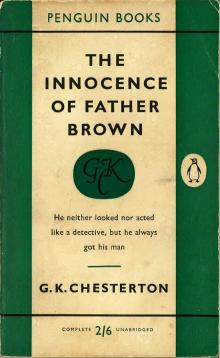 The Innocence of Father Brown
The Innocence of Father Brown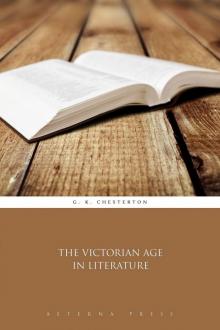 The Victorian Age in Literature
The Victorian Age in Literature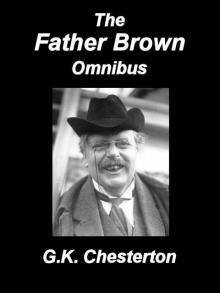 Father Brown Omnibus
Father Brown Omnibus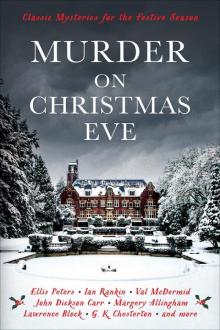 Murder On Christmas Eve
Murder On Christmas Eve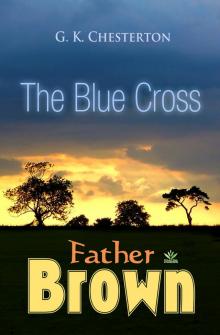 The Blue Cross
The Blue Cross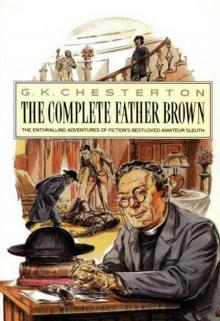 The Complete Father Brown Mysteries Collection
The Complete Father Brown Mysteries Collection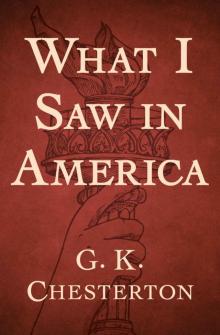 What I Saw in America
What I Saw in America